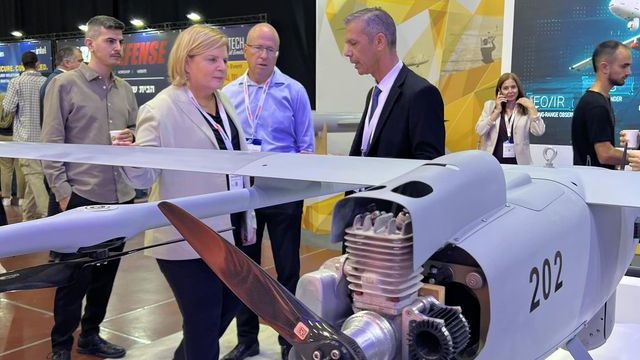Understanding Benefits UAVs Bring to Military, Civil Society Explores Its Multiple Uses
In first, Israeli company deploys automated drone municipal infrastructure in the UAE
The cameras and sensors of bustling cities hum overhead, becoming eyes in the sky for unmanned aerial vehicles (UAVs), known in everyday parlance as drones. These flying machines have multiple uses, as UAVs have transcended their original military purposes and are making their mark on the civilian world.
Some of the leading Israeli companies in the field had their technologies on display Wednesday in Tel Aviv at the UVID Dronetech 2022 event, put on for the 10th time by IsraelDefense magazine, to “develop dialogue and build a shared knowledge world for the broad community that engages in building the power and operation of this fascinating field,” according to its website.
The first version of UAVs dates back 120 years.
It was then, says Gilad Landsberg, vice president, head of the Tactical & MALE UAS Division at Aeronautics Group, that militaries used hot air balloons with bombs hanging from them and with a timer that released the bombs when they were approximately above the target.
He told The Media Line that, in the last 30 years, UAVs have played a central role in the military world. “As you can see in Ukraine, and before that in the Nagorno-Karabakh conflict between Armenia and Azerbaijan, the UAS (unmanned aerial systems) are very relevant,” he said, adding that the fact that drones have been broadly discussed in the media lately, for example, their role in the Russia-Ukraine war, brings awareness of the relevance that they have had for decades in the military context.
Noam Lidor, VP of sales, marketing and business development at Steadicopter, told The Media Line that UAVs/UASs have experienced a revolution in the military arena, such as the development of unmanned platforms to launch the UAVs. He adds that the ultimate revolution is about creating systems that are “smaller, more compact and much more efficient.”
These technologies, which have been rapidly developing within a military context, are now breaking barriers to penetrate civilian life as well.
This holiday season, give to:
Truth and understanding
The Media Line's intrepid correspondents are in Israel, Gaza, Lebanon, Syria and Pakistan providing first-person reporting.
They all said they cover it.
We see it.
We report with just one agenda: the truth.


“As we already know the operational benefit that it brings in the security field, we understand the potential that this thing has in the urban space,” Brig. Gen. (res.) Alon Kloss, co-founder and COO at Cando Drones, Ltd. told The Media Line.
He notes that using such simple capabilities, such as lifting cameras and the sensors into the sky, the UAVs can “open a whole world of uses to meet the needs of the municipal space.”
As we already know the operational benefit that it brings in the security field, we understand the potential that this thing has in the urban space
Landsberg says that the UAVs are already performing some civil missions and noted that the Israeli company Aeronautics Group is taking care of catching illegal fishing through their UAV technologies.
Eitan Rotberg, SVP of product and marketing at Airobotics, told The Media Line that his company is developing automated drones and focusing on developing automated launching infrastructures for cities. This is so that drones can be sent on various municipal service missions.
This developing field also is helping to strengthen commercial ties between new partners in peace post-Abraham Accords. For example, in a first, the Israeli company Airobotics is deploying its systems to the UAE.
“Today we announced that we are going to deploy our first municipal infrastructure to the UAE which is very exciting,” said Rotberg on Wednesday at the UVID Dronetech event.
As a step forward in the transition of UAVs from the military to the civil world, some students in Israeli high schools have access to a special program, created by the Atidim organization, that brings together the relevant disciplines and adds tools for these students to succeed in the UAV industry.
Yoav Maoz, CEO at Atidim, told The Media Line that a program called “Blades” for students in 11th and 12th grades in the periphery of Israel, has as its objective to teach them about the world of drones, aeronautics, mechatronics, electronics and software.
In this case, the thriving industry of drones also is serving social ends in Israel, as it helps the youth from the periphery engage in the central business sphere.
There are limitations standing in the way of fully transitioning to the civil use of drones, says Landsberg, such as regulations and airworthiness. But once it crosses this threshold, he says, “I believe that we will see the spread of the UAS into the civil world,” which he projects will happen in the next few years.

